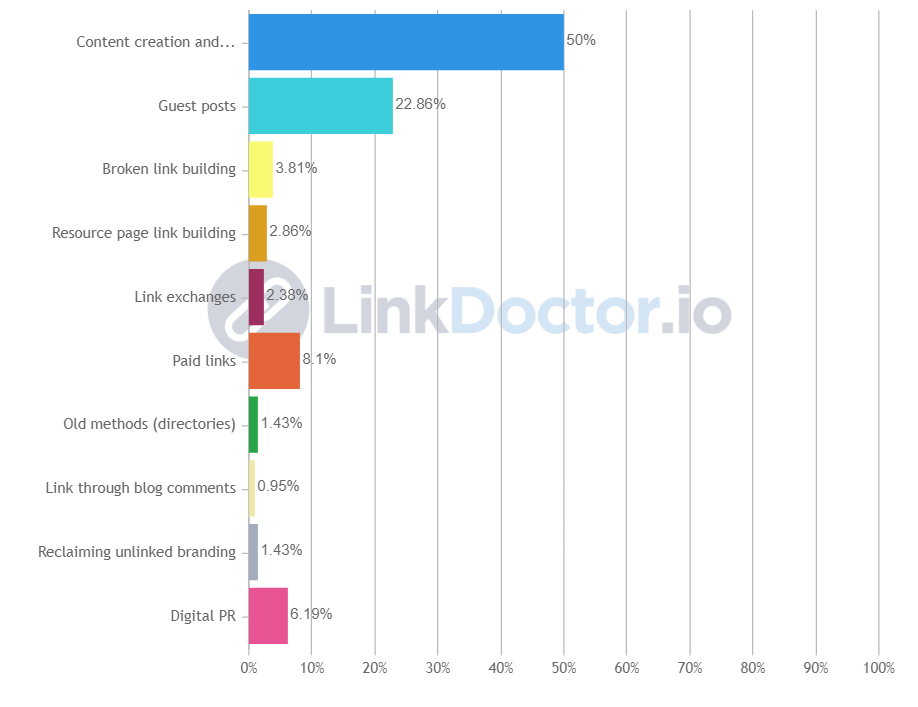Why should ranking be one of your main goals?
Well, search engines, like Google, are the main way people find information online. And most users never go past the first couple of results, let alone the second page.
A higher rank means Google thinks your page is relevant to somebody's question. This translates to more traffic for your page.
One of the best ways of improving your rank is to start to build organic links.
Why organic?
First of all, it's free.
Second, it has nothing to do with practices that are generally frowned upon by Google, like paid links.
In its 2020 link building survey, LinkDoctor asked hundreds of SEO professionals what is their preferred link building method. In this article, we'll explore some of these that can be done organically.

So How Do You Gain Organic Links?
1. Focus on Having Valuable Content
Never forget that you write for people, not Google. If you give users what they want, they will be inclined to link to you.
Write content that is valuable and enlightening. Create posts that move people. Make your readers say “Others need to see this!”
Amazing content is the best policy. Not only will people link to you, but they will come back for more. This means your traffic will increase over the long run.
2. Keep Up with the Trends
This doesn't mean that you should constantly change your topic just to fit in. Instead, try to adapt your content to what people are searching for.
Are there any adjacent popular topics that you could write about? For example, say you have a blog about building websites. If you have knowledge in this domain, you could also teach them how to improve their content.
Another good strategy is talking about the latest news in your domain. It's a good way of keeping your community informed. But, also, if you're one of the first to talk about an exciting piece of news, people will begin linking to you as their source.
3. Be Active on Social Media
This is where people spend most of their time and where you should be active as well. Create an online community around your product.
Social media is a great place to share the news about your company or your latest blog posts.
Doing this can pay off in more than just links. It can help you get to know your existing audience better. Or you can use it to extend your reach to new people.
Having an active social media account is like saying, ” Hello, I'm here, let's get to know each other!” It makes you feel trustworthy and more approachable.
4. Teach People Something New
As you probably know, ” How to” articles and tutorials are highly appreciated by people. They have a lot of advantages over “regular” blog posts.
They are structured in a way that is easy to read. The information is broken down into digestible pieces, or steps. They also focus on a very specific problem and how to solve it.
Sometimes, it's not just about obtaining links. It's also about having something that no one else has. At least for now, until they link to you.
Tutorials are probably the most popular type of online content. And for a good reason. Find out what problems people have and walk them through the best solution.
5. Answer Questions
There are many places where people ask questions online. It could be forums or dedicated platforms, like Quora. Engaging with users who need help is a great way of obtaining links.
While this is an opportunity, don't just drop your link and move on. Try to answer the question in a way that solves the problem or adds value to the conversation.
If people see that you are genuinely making an effort to help them, they will reward you with a link. Don't force it. Remember, your goal is to obtain links naturally.
Being an active part of your community has many rewards. Helping fellow users will help them see you as an authoritative source of information. It will also humanize you, making you more approachable.
6. Give Out Free Services
Remember that you're trying to improve your online community. You can do this by offering free samples of your work or free trials of your product. If you can afford it, you can even provide a free service.
Try to make other's user experience better. People will see that you're making an effort and will reward you with a link.
But that's not all. There are many so-called resource pages or listicles that showcase different types of products for people to use. Your service doesn't have to be free to be featured, but it's a plus.
So what is the lesson here? Don't just aim for immediate gains. Strive to make a difference in people's lives. Improve their online experiences. This way, there will be many more benefits in the long run.
7. Diversify Your Links
If you obtain your link in a natural way, it would be weird (and inefficient) if they all pointed to your homepage. While it sounds tempting, there should be some variety.
Only linking to your homepage sounds like a good strategy. We get the appeal. It showcases all of your content. It features all of your services. And if people want to find something they can just search for it. Right?
Technically, yes. But you're forgetting one thing.
People want to find what they're looking for fast. We live in the age of speed.
So try to link to a page that fits the context. The user is happy, they found the solution to their problem. And if they like what they read, they will go looking for more.
8. Guest Posting
This can get a bit tedious, but it's definitely worth the effort. By doing this, you have the opportunity to write amazing content for a fellow blogger.
Guest posting gives you the chance to share your expertise with a new public. Help people who are unfamiliar with your content and grow your reach.
You will need to do a bit of research. Find blogs that write on the same topics as you. Try to match their tone and writing style. But, most importantly, show the blog owner that you can provide valuable content.
Guest posting is a difficult, long-term process. Most SEO professionals spend a lot of time on tasks from their outreach strategy. If you want to read more about this, you can find more info online.
9. Engage with Your Community
This is something you should do whenever the opportunity arises. Your readers are the reason why you create content. It's only natural that you should keep in touch with them.
You can extend that to fellow bloggers. For instance, you can comment on other people's posts. But don't just drop your link. Make sure you have something important to say that adds value to the subject.
Don't see the other bloggers in your domain as competition. Try a healthier point of view. You're working together to make one's online experience better.
Having an online presence will help you reach more people in the long run. If you're actively trying to use your experience to help or teach others, people will see that and they will link to you as their trusted source of information.
10. Get Creative with Your Anchor Text
Let's get technical. Organic links shouldn't have the same anchor text all the time. It looks spammy and unnatural. Try to find alternatives, without using the same keywords over and over.
You can use branded text. But do it with caution as using your company's name can come off as promotional.
Or try to use relevant keywords, just vary them from time to time. Utilize synonyms, plural forms, or different phrases as your anchor text.
The key point here is that you should match your anchor text to the type of content wherever you're inserting your link. Adding links naturally will only enhance the value of the content, without disrupting its purpose.
What to Keep in Mind
Having backlinks to your website is something you should try to achieve. The more, the merrier. Bonus points if they're organic. This tells search engines that your content is relevant so they rank it higher and in turn, this means more traffic for your website.
You can gain organic links in many ways. No matter which option you chose, be it guest posting or writing about the latest news, you should keep only one thing in mind.
Your content should bring value to people's lives.




